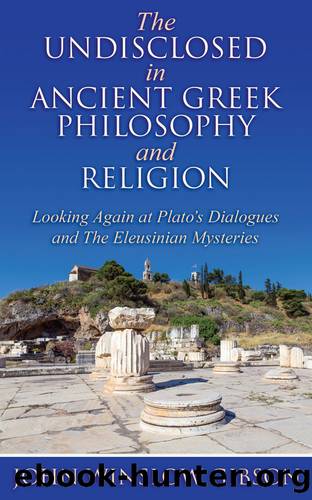The Undisclosed in Ancient Greek Philosophy and Religion: Looking Again at Plato's Dialogues and Eleusinian Mysteries by Gibson John Winslow

Author:Gibson, John Winslow [Gibson, John Winslow]
Language: eng
Format: epub
Publisher: Dog Ear Publishing
Published: 2017-05-22T16:00:00+00:00
PLATO HIMSELF
I want to consider Plato as a person, who he was and what made him “tick”.
In his Seventh Letter at 328c, he speaks of why he went to Syracuse: “I was not guided by the motives that some men attributed to me, but chiefly by a concern for my own self-respect. I feared to see myself at last altogether nothing but words, so to speak – a man who would never willingly lay hand to any concrete task, for I should practically have been guilty of disloyalty – in the first place to the ties of hospitality and friendship that bound me to Dion [a Syracusan statesman and friend of Plato’s who was in conflict with Dionysius]. He was really exposed to considerable danger.”
He adds at 329b:
“For such reasons as I have described, I forsook my own pursuits, and they were not undistinguished, to come under a tyranny, a form of government seemingly inconsistent with my doctrines and my character. In doing so I cleared myself in the sight of Zeus Xenios and left no ground of complaint to the cause of philosophy, which would have suffered reproach if I had turned weakling and had by refusing to play a man’s part brought disgrace upon myself.” He sees himself as having been a victim of adverse circumstances when acting for the sake of integrity, citing a religious and moral dimension to the situation: all very different from the motivation that a Strauss or someone like S would be wont to attribute to him.
At 329c he says, revealingly: “[O]n the ground that Dion was plotting against the government, Dionysius put him aboard a small boat and expelled him dishonorably. Thereupon all of us who were friends of Dion were in terror lest Dionysius should accuse and punish someone else for complicity in Dion’s plot.” At 333a he says: “[W]e were supposedly plotting against Dionysius, according to the tales which flowed from many sources and which, while prevailing with Dionysius, brought about Dion’s expulsion and threw us into a state of panic.” And at 340a he describes his condition of mind as he later returned reluctantly to Syracuse at the urging of Dionysius and the exiled Dion, the latter hoping to be allowed to return home and have his property restored: “So I did set out under cover of these arguments, full of fears, as you might expect, and foreboding no very good result.”
He could have described these situations, indicating how oppressive they were, without alluding to his own feelings. He doesn’t hesitate to ascribe fear, terror, and even panic to himself. However preoccupied he may be with how a thing will look to people or how his actions may be construed, he doesn’t take appearance for reality and is unwilling to fabricate in order to make himself seem more ideal and masterful than he is.
He’s also just, sometimes praising Dionysius in his Letters for having shown forbearance. Although very critical of the tyrant, Plato doesn’t think in black-and-white terms, and his reasoning isn’t made one-sided by emotion.
Download
This site does not store any files on its server. We only index and link to content provided by other sites. Please contact the content providers to delete copyright contents if any and email us, we'll remove relevant links or contents immediately.
| Anthropology | Archaeology |
| Philosophy | Politics & Government |
| Social Sciences | Sociology |
| Women's Studies |
The Thibaults by Roger Martin Du Gard(1305)
the god delusion by richard dawkins(1085)
The Case for God by Karen Armstrong(960)
New Testament by Harper Bibles(812)
Not in His Image: Gnostic Vision, Sacred Ecology, and the Future of Belief by Lash John Lamb(749)
Not in His Image: Gnostic Vision, Sacred Ecology, And the Future of Belief by Lash John Lamb(740)
Spook by Mary Roach(715)
The Egyptian Book of the Dead by John Romer(679)
Atheism For Dummies (For Dummies (Religion & Spirituality)) by McGowan Dale(610)
God Is Not Great: How Religion Poisons Everything by Christopher Hitchens(563)
A History of God by Karen Armstrong(552)
The Rosicrucian Mysteries by Max Heindel(528)
Selected Writings by Thomas Aquinas(528)
Abandonment to Divine Providence by Jean-Pierre de Caussade(506)
The Seven Storey Mountain by Thomas Merton(503)
Religion for Atheists by Alain de Botton(503)
God Without Being by Jean-Luc Marion(492)
The Garden of the Prophet by Kahlil Gibran(483)
Kierkegaard by Stephen Backhouse(473)
